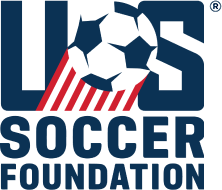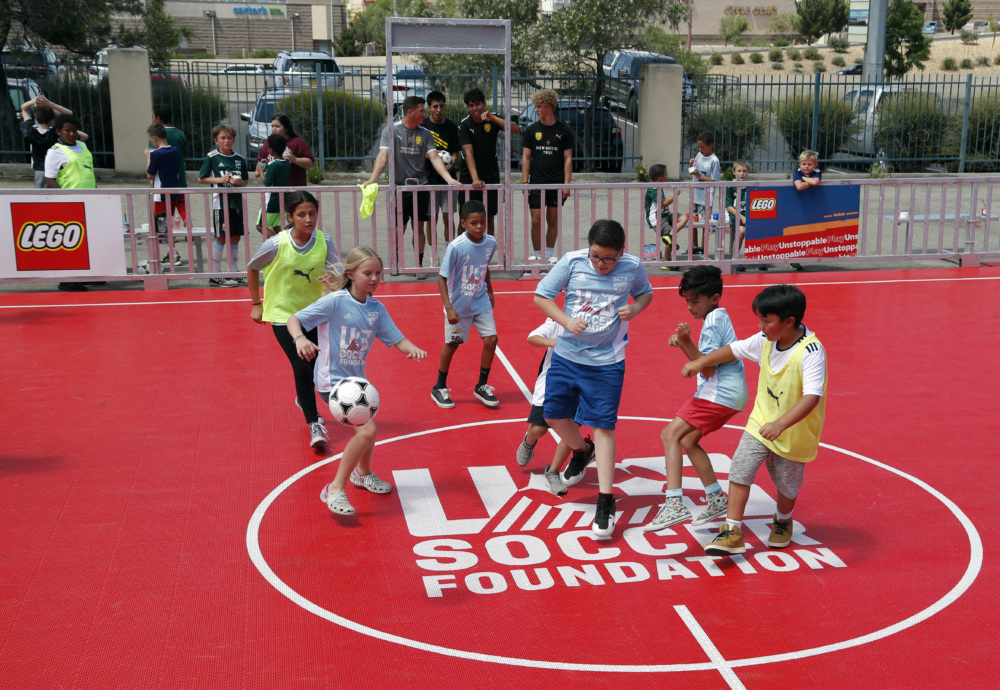

Let soccer do what soccer does.
Together, we can give millions of kids from underserved communities safe places to grow, thrive and build confidence for life.
The Important Role Boys Play in Standing United for Girls
“Thank you. I really didn’t know how a girl would feel if we, as boys, don’t treat them the way they deserve.”
These words came from a 6th grade boy who participates in FLIPANY’s Soccer for Success program at Deerfield Beach Middle School. FLIPANY is a U.S. Soccer Foundation partner of over 150 afterschool providers based in Florida that implements nutrition education, physical activity, and wellness initiatives at partner sites.
In June 2019, the U.S. Soccer Foundation launched United for Girls, an initiative aimed at increasing opportunities for young girls and women from underserved communities to play soccer and reap its many benefits. FLIPANY joined the U.S. Soccer Foundation’s United for Girls cohort to learn how to identify, elevate, and scale best practices for recruiting and engaging women coach-mentors and players in U.S. Soccer Foundation programs.
Over the last year and a half, the United for Girls cohort has engaged in multiple webinars that provided them with opportunities to learn from experts, share promising practices, take a critical look at their organizational practices, and identify opportunities for improvement. A large part of this work was understanding the barriers to participation that exist for their female participants and coaches and identifying specific strategies they can utilize to address those barriers.
In doing so, FLIPANY realized they had an opportunity. “It was an interesting dialogue for us as a coaching staff in terms of how to engage the women,” says Amy Gough, Director of Public Health at FLIPANY. “But we realized we couldn’t eliminate the men. They’re on the field and we want them on the field. We want better representation for females and coaches and female players, and so we can’t ignore their counterparts.” Ultimately, the coaching staff determined that, for as much effort and resources they could put in to helping girls feel supported and included, they had to also arm the boys with the ability to help support, create, and maintain that environment.
This is where FLIPANY program coordinator Michelle McCaw came in. Michelle has been a key innovator to building an environment of inclusivity on a variety of levels. One such level is educating boys on what it means to play with girls.
The process first started with surveying the girls. What is it that keeps them from playing sports? Michelle said that most reported that they didn’t feel included because “the boys don’t want us to play” or “they talk to us this way.” These were the beliefs they held just based on how the boys communicated with them.
The results helped Michelle shape an approach to education. “We realized that understanding girls and what girls go through can help boys have a better way of communicating and see, along with nutrition and physical activity, the benefit of treating them in a different way,” Michelle explains. “If you talk to a girl this way,” she would say to the boys, “if you are able to see their goals and match your goals with their goals, you will be able to have a better relationship, better friendship, better teams.”
“We’re going to eliminate language like ‘stop playing like a girl’ rather than just rebranding it,” Amy adds. “For example, does it matter how girls dress? Can they play with lipstick on? Does it take away from their skill?” These questions and more helped frame the activities that both girls and boys would participate in to better understand each other.
Michelle notes that a key piece of the puzzle was modeling by male coach-mentors. Training for male coaches involved lessons on how to deliver these types of questions and to help the boys think about their communication styles, learned behavior, and perceptions of their female classmates. “We need to create a healthy community where girls feel they can participate in sports,” Michelle says. “They need to see a male coach treating another female coach at that level.”
For Coach Manny, this training provided the opportunity to build on skills he had learned growing up and working with people with disabilities in Colombia. “I took some trainings about how to encourage youth, how to talk to them, and how to take care of them,” he reflects. “Eventually, this made me realize that there was actually something that I could do to help change the perspective of people who may be struggling in any way about life and their situation.”
Now, he says of his work at FLIPANY, “I wanted to create a space where the boys could ask questions. For some, it was hard for them to figure out how to treat [girls] as a competitor while being respectful.”
“Having the sensitivity of growing up surrounded by women (my mother, my three sisters, and, eventually, getting married and becoming a father of two girls) has given me a very close perspective of what many women have to go throughout the day. I share that with these young men, let them think about their sisters, about children, about their mothers, and about their friends as females – and about how strong they are as people and as athletes. It gives them a lot to think about!”
In various sessions throughout the week, boys and girls create vision boards, develop SMART goals, journal, write poetry, and participate in other guided learning that helps them envision and act on the way they want to treat one another. Goals vary from “I want to take better care of my mental health” to “I’d like to manage my time a bit better” to “go out of my comfort zone” to “spend more time with my family” and “get along with my brother.”
Early results from these types of activities show that more students are journaling, are interested in nutrition and recipes, want to participate in sports, and even want to try new sports. “The girls have learned that it’s not necessarily that only boys can do it,” says Michelle.
But the education isn’t just impacting the students. “Since the very first moment that we planned the training and its execution,” says Coach Manny, “it has given me a couple of opportunities to reassess my role as father, husband, and brother. It also taught me to become more aware of the people that surround me and the way I communicate with them.”
While the program seeks to educate boys on the power of communication – and the power of empowering their female classmates – the girls have also learned the importance of improving their communication skills both on and off the field. “We all get frustrated and don’t treat each other very good,” said one participant, “so it’s good to stop and think about how we should act when we get frustrated in the game.”
“I think the most important part of this process,” says Coach Manny, “is to leave an imprint on the students’ minds, to change how they view their peers and how they interact with them.”
Learn more about the U.S. Soccer Foundation’s United for Girls efforts here.
